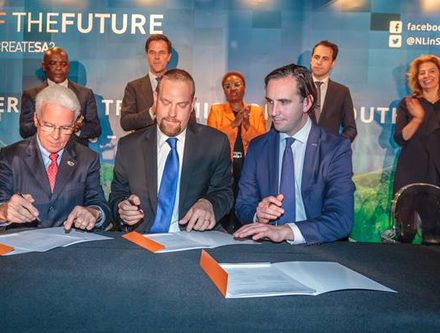The Netherlands and Brazil agree on an intensive public-private program on sustainable biorefineries
november 25, 2015

São Paulo, 25 November 2015 – Director General Hans Schutte of the Netherlands Ministry of Education, Culture and Science, Scientific Director Carlos Henrique de Brito Cruz of FAPESP and president Luuk van der Wielen of BE-Basic Foundation confirmed their intended support to continue their successful collaboration and enable a challenging program of academia and industry to jointly develop sustainable biorefineries for aviation fuels and chemical building blocks, and to develop the required professional workforce.
Monday 23 November 2015, in a meeting hosted by FAPESP, BE-Basic Foundation and the Netherlands Network for Innovation, Technology and Science (NL-NITS) within the Dutch Consulate General, leaders from international companies including DSM, Corbion, Boeing and Embraer discussed their interests and commitments for sustainable production of fuels and chemical building blocks, to help reduce climate change and build a sustainable economy. Together with experts from the Centre for Bioethanol (CTBE) and the Brazilian and Dutch universities USP, UNICAMP, WUR and TU Delft, a challenging program was agreed upon for the conversion of agricultural residues and organic waste streams to value added products such as aviation fuels and plastics.
The program expands on the existing joint projects, aiming to clarify the fundamental questions around pre-treatment and conversion as well as on integration of sustainable choices. This will result in models and tools which can be used for business decisions. Promising designs will be tested at pilot scale resulting in demonstrations, so that the optimal routes can be validated and properly prepared for actual deployment in society. In order to ensure sufficient professional workforce, it was agreed on to expand the collaboration on the Dual Degree PhD programs. These will be supported by high level educational materials and programs (including MOOCs, joint technological and business courses as well as more advanced vocational training in the Living Labs).
BE-Basic, NWO and FAPESP intend to align their programs in Brazil to facilitate these ambitions. Schutte underlines the importance of the collaboration: “We are extremely happy and proud to see the great progress that Brazilian and Dutch parties have made in the last years. The plans expressed during the Minister’s presence in August were developed into a joint ambitious public-private program that brings Brazilian and Dutch academia, research institutes and industry together, and has the potential to be world leading. The Dutch government intends to support this as a firm basis for continued and intensified collaboration.”
All participants stressed that the further implementation of biobased sustainable business is highly dependent on good communication to show the positive impacts of biorefineries, which can help to derisk business development. Such actions can best be organised in international contexts such as the recent meeting at the World Bank presenting the jointly produced SCOPE report on Bioenergy and Sustainability and will be supported by the new program.

